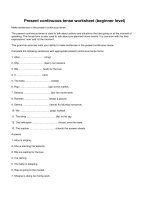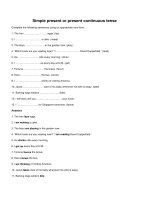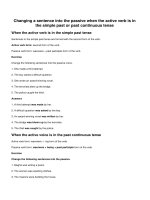Future continuous tense
Bạn đang xem bản rút gọn của tài liệu. Xem và tải ngay bản đầy đủ của tài liệu tại đây (9.91 KB, 1 trang )
Future continuous tense
The
future continuous tense
is used to say that an action or a situation will be going on at a particular moment
in the future.
It has the following forms.
Affirmative Interrogative Negative
I will be working in the evening. Will I be working in the evening? I will not be working in the evening.
She will be waiting for his call. Will she be waiting for his call? She will not be waiting for his call.
They will be examining the
candidates.
Will they be examining the
candidates?
They will not be examining the
candidates.
With the first person pronouns
I
and
we
,
shall
can be used instead of
will.
This usage is common in British
English. In American English
shall
is not normally used to make future tenses.
The
future continuous tense
is also used to refer to future events which are expected to happen in the normal
course of events. Note that it does not suggest the idea of personal intention.
I will be seeing you one of these days.
You will be hearing from us soon.
Polite enquiries
The future continuous tense can be used to make polite enquiries about people’s plans.
Compare:
Will you be joining us? (Very polite enquiry, suggesting ‘I just want to know your plans’)
Are you joining us? (A direct question)
Be first to know when grammar rules change! Sign up to our newsletter here: englishgrammar.org (It's free)
Powered by TCPDF (www.tcpdf.org)









